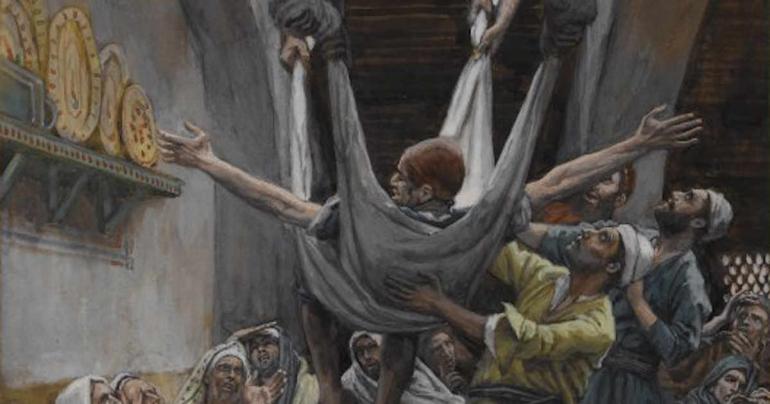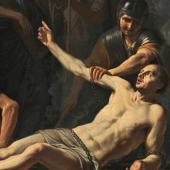Loving the Proud and Arrogant

And some men brought on a stretcher a man who was paralyzed; they were trying to bring him in and set him in his presence. But not finding a way to bring him in because of the crowd, they went up on the roof and lowered him on the stretcher through the tiles into the middle in front of Jesus. Luke 5:18–19
It’s interesting to note that, as these faith-filled friends of the paralyzed man lowered him down from the roof in front of Jesus, Jesus was surrounded by Pharisees and teachers of the law “from every village of Galilee and Judea and Jerusalem” (Luke 5:17). The religious leaders came in droves. They were among the most educated of the Jews and happened to be among the ones who had gathered to see Jesus speak that day. And it was partly on account of large numbers of them gathering around Jesus that the friends of the paralyzed man could not reach Jesus without this radical move of opening the roof.
So what does Jesus do when He sees the paralytic lowered before Him from the roof? He told the paralytic that his sins were forgiven. Sadly, those words were immediately met with severe interior criticism from these religious leaders. They said among themselves, “Who is this who speaks blasphemies? Who but God alone can forgive sins?” (Luke 5:21)
But Jesus knew their thoughts and decided to do one more act for the good of these religious leaders. The first act of Jesus, to forgive the paralytics sins, was for the good of the paralytic. But the paralytic’s physical healing, interestingly, appears to be primarily for these pompous and self-righteous Pharisees and teachers of the law. Jesus heals the man so that they will “know that the Son of Man has authority on earth to forgive sins” (Luke 5:24). As soon as Jesus performs this miracle, the Gospel tells us that everyone was “struck with awe” and glorified God. Apparently, this included the judgmental religious leaders.
So what does this teach us? It shows how deeply Jesus loved these religious leaders despite their exceptional pride and judgmentalness. He wanted to win them over. He wanted them to convert, humble themselves and turn to Him. It’s somewhat easy to show love and compassion to one who is paralyzed, rejected, and humiliated already. But it takes an incredible amount of love to also care deeply about the proud and arrogant.
Reflect, today, upon the love Jesus had for these religious leaders. Though they came to find fault with Him, falsely judge Him and continually tried to trap Him, Jesus never ceased in His attempts to win them over. As you think about this mercy of our Lord, consider also the person in your life who is most difficult to love, and recommit to loving them with your whole heart in imitation of our divine Lord.
My most merciful Lord, give me a heart of forgiveness and mercy for others. Help me, especially, to have a deep concern for those whom I find most difficult to love. In imitation of Your divine mercy, strengthen me to act with a radical love for all so that they will come to know You more deeply. Jesus, I trust in You.
Radio Veritas Asia (RVA), a media platform of the Catholic Church, aims to share Christ. RVA started in 1969 as a continental Catholic radio station to serve Asian countries in their respective local language, thus earning the tag “the Voice of Asian Christianity.” Responding to the emerging context, RVA embraced media platforms to connect with the global Asian audience via its 21 language websites and various social media platforms.














